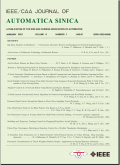自动化学报(英文版)2024,Vol.11Issue(4):851-865,15.DOI:10.1109/JAS.2024.124257
Cybersecurity Landscape on Remote State Estimation:A Comprehensive Review
Cybersecurity Landscape on Remote State Estimation:A Comprehensive Review
摘要
关键词
Cyber-attacks/Kalman filtering/remote state esti-mation/unreliable transmission channelsKey words
Cyber-attacks/Kalman filtering/remote state esti-mation/unreliable transmission channels引用本文复制引用
Jing Zhou,Jun Shang,Tongwen Chen..Cybersecurity Landscape on Remote State Estimation:A Comprehensive Review[J].自动化学报(英文版),2024,11(4):851-865,15.基金项目
This work was supported by the Natural Sciences and Engineering Research Council(NSERC)of Canada. (NSERC)

